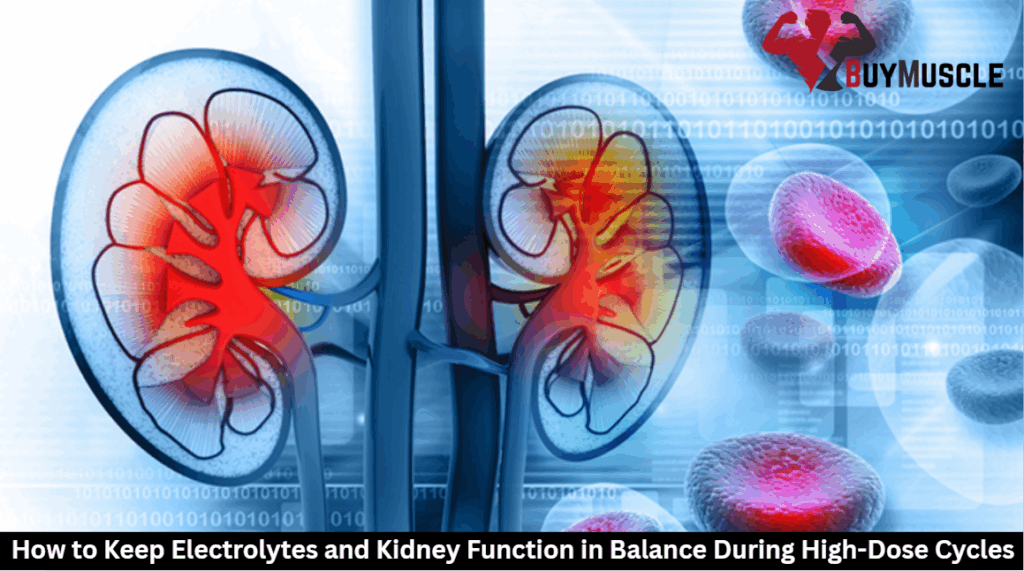To keep your kidneys safe while managing electrolytes during high-dose cycles, you need to do it all the time. You should drink 3–4 liters of water every day, keep an eye on your sodium and potassium levels, and take nephroprotective supplements like NAC and milk thistle. Look out for warning signs like muscle cramps, feeling unusually tired, and changes in how often you pee.
Regular blood tests are important to keep an eye on your electrolyte levels and keep your kidneys from getting too stressed. Timing your supplements and staying hydrated are the most important things.
The Relationship Between the Kidneys and Electrolytes During Performance Enhancement
The body’s natural balance can handle normal physiological needs, but high-dose performance enhancement cycles put a lot of stress on the kidneys. Your kidneys are very important for keeping your electrolytes in balance. They work extra hard to filter out toxins and keep minerals in check.
When you’re on your period, your sodium levels can go up, which can raise your blood pressure and make you hold onto more water. At the same time, it gets harder to control potassium levels because cells take in potassium differently, which affects muscle function and heart health. How well your kidneys can handle these changes depends on how well you are hydrated.
Managing electrolytes and kidney function are two parts of the same system, not two separate problems. To keep this delicate balance, you need to pay close attention, because even small changes can lead to a drop in performance and health problems that last long after your cycle ends.

Keeping the Right Levels of Important Minerals
Sodium, potassium, magnesium, and calcium are four important minerals that you need to watch closely when managing performance-enhancing cycles. These electrolytes work together to keep your sodium-potassium pump working, which is important for cell signaling and muscle contractions.
If you have symptoms like fluid retention or muscle cramps, you should have regular blood tests to check these levels. During cycles, sodium usually needs to be cut back, while potassium often needs to be added to balance out the effects of hormones. To stop cramps and help cells make energy, magnesium support is very important.
Eating foods like bananas and potatoes every day will help keep your kidneys healthy. Aim for up to 5,000 mg of potassium per day. Take 300–400 mg of magnesium glycinate before bed to help your body heal. Keep in mind that having too much or too little of these minerals can directly affect how well your kidneys work and how well you do overall.

Supplements and Compounds that Protect the Kidneys
Adding nephroprotective compounds is important for long-term kidney health because high-dose cycles put a lot of stress on kidney function. NAC, milk thistle, and cranberry extract are all proven to protect the kidneys. They help reduce stress on the kidneys and support detoxification pathways.
Astragalus and CoQ10 can help keep kidney tissues safe from oxidative damage that often happens with high doses of certain drugs. Potassium citrate also helps keep the balance of electrolytes and stops kidney stones from forming.
When choosing supplements, look for ones that help keep you hydrated and bring your creatinine levels back to normal, like taurine and glycine. Keep in mind that timing is important. Taking nephroprotective supplements regularly throughout your cycle is better than only taking them when you have symptoms.

Ways to Stay Hydrated to Reduce Stress on the Kidneys
In addition to supplements, drinking enough water is the most important thing you can do to protect your kidneys during high-dose cycles. To keep your kidneys working well and help get rid of toxins, you need to drink at least 3–4 liters of water every day. Instead of drinking a lot of water all at once, space it out over the day.
Monitor your hydration by paying attention to urine color. If it’s a light yellow shade, you’re likely getting enough fluids. Drinking more water isn’t enough when your electrolyte balance is off. Think about taking electrolyte supplements that have sodium, potassium, and magnesium in them, especially after hard workouts. Sugar-free choices help keep you hydrated without adding extra calories.
Drinking water before and after working out helps your kidneys handle the extra metabolic waste from your cycle with less stress.
Warning Signs of Electrolyte Imbalance and Kidney Stress
If you know the early warning signs of an electrolyte imbalance, you can avoid serious kidney problems during high-dose cycles. If you have muscle cramps that don’t go away, especially in your calves and feet, it could mean you don’t have enough potassium or magnesium. If you feel tired all the time, have headaches, or have trouble controlling your blood pressure, your electrolyte balance may be off.
Changes in how often you urinate will tell you that your kidneys are under stress. If your urine is darker, less frequent, or foams unusually, it may not be working properly. These problems get worse when you don’t drink enough water, so keep an eye on how thirsty you are.
Suppose you have mental confusion, nausea, and swelling that you can’t explain, especially around your ankles and face. In that case, you need to see a doctor right away because there could be signs of serious electrolyte imbalances that are affecting your kidneys. Pay attention to these signs. They’re your body’s way of letting you know that something might be wrong.
Frequently Asked Questions
How long does it take for electrolyte imbalances to go back to normal after the cycle is over?
Usually, you will get your electrolyte balance back to normal within 1–2 weeks of finishing the cycle. However, if the imbalance is very bad, it may take 4–6 weeks. As you recover, focus on staying well-hydrated, maintaining a nutrient-rich diet, and monitoring your intake of key minerals.
Can taking over-the-counter painkillers make your kidneys work harder during your period?
Yes, they can. Ibuprofen and other NSAIDs lower blood flow to the kidneys and make the strain worse during cycles. If you already have electrolyte imbalances or kidney stress, try to avoid these drugs as much as possible.
Does having a genetic predisposition make your kidneys more likely to be damaged during high-dose cycles?
Yes, your genes have a big effect on how vulnerable your kidneys are during high-dose cycles. If someone in your family has had kidney disease, you are at a higher risk and should think about getting checked more often and taking less medicine.
How do cardiovascular supplements affect how well your kidneys work during cycles?
During cycles, cardiovascular supplements can put a lot of stress on your kidneys. CoQ10 is usually safe, but nitric oxide boosters may make the body need more filtration, while omega-3s may help. When you take these supplements together, you should always check your kidney markers.
Should electrolyte protocols be different for bulking and cutting cycles?
Yes, your electrolyte needs are very different from one cycle to the next. When you’re bulking, eat more potassium and magnesium to help your muscles grow. When you’re cutting, keep a closer eye on your sodium levels because the risk of dehydration goes up when you don’t hold onto water.







